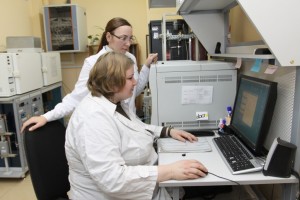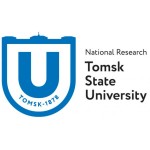Department of catalysis
The head of the department: Oleg V. Magaev, PhD
Employees of the department: Prof. Larisa N. Kurina; Prof. Olga V. Vodyankina; Tamara S. Kharlamova, PhD; Oleg V. Magaev, PhD; Alexey A. Krejker; Marina P. Nikitich, PhD; Anna S. Savelieva; Alexander N. Sinelnikov; Pavel G. Musich; Tatiana. A. Bugrova; Viktoria. V. Torbina; Olga. Y. Vodorezova; Arina. A. Merk; Ekaterina. D. Sushchenko; Andrew. A. Vodyankin.
The department carries out development and improvement of existing catalytic systems and new catalytic processes, estimation of kinetic parameters to optimize the catalytic processes. The department is equipped with modern equipment which allows synthesizing new heterogeneous catalysts and carrying out their lab- and pilot-scale tests. To investigate complex catalytic processes several completely automated units were constructed.
The major research themes of the department:
Olefin metathesis reactions over supported catalysts
Group leader: Alexander V. Gordeyev
Olefin metathesis reactions represent the process of alkylidene fragment exchanges between olefin molecules:

The process of the light olefin metathesis reactions over the supported catalysts are now under study at the laboratory of catalytic research of TSU. The principle process is represented in the scheme:

The catalysts for these reactions are molybdenum (VI) and tungsten (VI) oxides supported over various supports. The major research activity is connected with synthesis of heterogeneous catalytic systems; research of the light olefin metathesis processes over heterogeneous catalysts; determination of the influence of conditions of metathesis reactions on the properties and characteristics of heterogeneous catalytic systems.
Catalytic synthesis of dimethyl ether
Group leader: Pavel G. Musich
Synthesis and application of dimethyl ester (DME) is a vital task actual. When used as fuel itself and/or fuel additives it can improve the quality of exhaust diesel engines with reduction of harmful component emissions due to high oxygen content and the absence С–С bonds in its structure. The most promising and economic method of DME production is based on its direct synthesis from CO and Н2 (the integrated technology: synthesis-gaz to DME) at the existing methanol productions. This allows the producer to lower the expenses on new constructions. The investigation of the catalytic activity of the samples is carried out using the high-pressure catalytic unit with the flow reactor in a stationary mode (CATACON LLC, Novosibirsk) with chromatographic analysis of the reaction products. A number of research works has been carried out to determine the parameters of the process of DME production from CO and Н2 over industrial catalysts of methanol synthesis (Katalco-58, ICI) and dehydration (γ-Al2O3). Optimal conditions for the process performance (pressure range of 1-5 MPa and temperatures of 220-300 °C) have been determined. The nature of interaction between the reagents (Н2, CO, СО2, СН3ОН, DME) with Katalco-58 and γ-Al2O3 catalyst surface has been detailed.
Investigation of the catalysts for oxidative coupling and cross-coupling of methane
Group leader: Tamara S. Kharlamova, PhD
During more than 50 years the research on the ways of effective transformation of methane into chemical products has been one of mainstreams in catalysis. Significant attention is now given to methane conversion into transportable liquid fuels and chemical compounds which are of importance to petrochemical industry. Oxidative coupling of methane represents a promising way of direct processing of natural gas to form valuable products of petrochemical synthesis, namely, ethane and ethylene:
8 СH4 + 3 O2 = 2 C2H6 + 2 С2H4 + 6 H2O.
The given reaction proceeds at 700−800 ºС in the presence of catalysts representing transition metal oxides as well as systems based on manganese oxides. The distinctive feature of this reaction is its heterogeneous-homogeneous mechanism.
As opposed to olefin synthesis via Fisher-Tropsch process or via methanol transformation the methane oxidative dimerization (MOD) to ethylene is carried out at atmospheric pressure through only one technological step. Despite existing problems of MOD hindering its practical application (low yields of desired products, large heat emissions) in the near future the MOD process can become competitive in comparison with ethane and ethylene production from oil, especially in those regions, where relative costs of natural gas is essentially below the prices for oil-produced ethylene (Russia, Iran, etc.).
Along with the MOD reaction the large practical interest is generated by the processes of methane cross-coupling with other organic compounds, in particular, toluene oxidative methylation (TOM) by methane with formation of ethylbenzene and styrene:

The TOM represents a promising way of styrene synthesis using cheap and widespread methane and toluene as well as ecologically safe catalysts. The products received by oxidative methylation are expected to be less expensive than the same products manufactured using existing technologies in the presence of AlCl3-HCl catalysts, which now include the use of expensive raw materials, benzene and ethylene, produced from crude oil and associated gas.
The research on new methods of synthesis and catalyst investigation for the processes of methane oxidative coupling and cross-coupling, including the catalysts based on silicates of rare-earth elements, lead stannate and others complex oxides, are being carried out at the laboratory. The nature of the surface active sites and peculiarities of the reaction mechanism over the investigated catalysts is being investigated.
Group leader: Oleg V. Magaev
The process of glyoxal catalytic synthesis is carried out by partial oxidation of ethylene glycol over the surface of Ag-containing catalysts according to the following scheme:

New catalyst for glyoxal synthesis has been developed at the laboratory of catalytic research of Chemical Department of TSU. This provided us with the opportunity to carry out the synthesis in more stable mode and scale-up the process. On the basis of the calculations carried out a “pilot” unit has been designed and established. The initial data to designing of the manufacturing facilities with production capacity of 1000 tons per year has been developed. In 2009 the first Russian glyoxal production using Russian catalyst has been started. The major direction of work is connected with scientific and technical support of the glyoxal pilot manufacturing facilities.
Development of catalysts for photocatalytic purification of water solutions
Currently, the development of ways of production of titanium-containing materials for the processes of photocatalytic oxidation of organic compounds and low-temperature oxidation of carbon monoxide is a vital task. One of the most promising ways to apply titanium-containing photocatalysts is a recycling of waste water solutions of methanol used as hydrate formation inhibitors at the development of gas condensate field. The developed catalysts are tested using photocatalytic unit representing photocatalytic reactor and a radiation source. The reactor is a specially designed quartz reactor with an inlet window made on optically transparent quartz capable to pass the UV radiation. A radiation source is PSL-C-250-10 and the DKs 500 xenon lamp. The method of synthesis of highly effective titanium-containing photocatalysts has been developed and several sample series have been obtained. It was stated that the obtained photocatalysts show activity in the processes of photodecomposition of methylene blue and methanol water solutions.
Total oxidation of hydrocarbons
The development and investigation of catalysts for total oxidation and combustion of hydrocarbons is carried out. Various catalytic systems were synthesized for and investigated in the processes of combustion of hydrocarbons and impurities, namely, bulk, ceramics- or metal-supported catalytic systems. The catalysts allow combusting CO and hydrocarbons or operating as a working medium in heat converters when working in stoichiometric mixtures air and hydrocarbons at a≥1.
Olefin production from hydrocarbons
Group leader: Sergey I. Galanov, PhD
The development and investigation of catalysts for olefin synthesis from natural gas with high methane concentration or associated petroleum gas with high concentrations of C3-C4 hydrocarbons is carried out. The reaction is investigated in a periodic mode when the catalyst is a reagent; the hydrocarbon conversion occurs using oxygen excess of crystal lattice of the catalyst with the subsequent oxygen completion by oxygen from air. The advantages of periodic process: use of air as an oxidizer, explosion safety, opportunity to organize the recycle.
- Methane is dimerized to ethane: 2СН4+0,5О2=С2Н6+Н2О.
- Ethane is dehydrated to ethylene: С2Н6+0,5О2=С2Н4+Н2О.
- С3–С4 paraffins are dehydrogenated and cracking to a mixture of olefins (ethylene, propylene, butylene).










